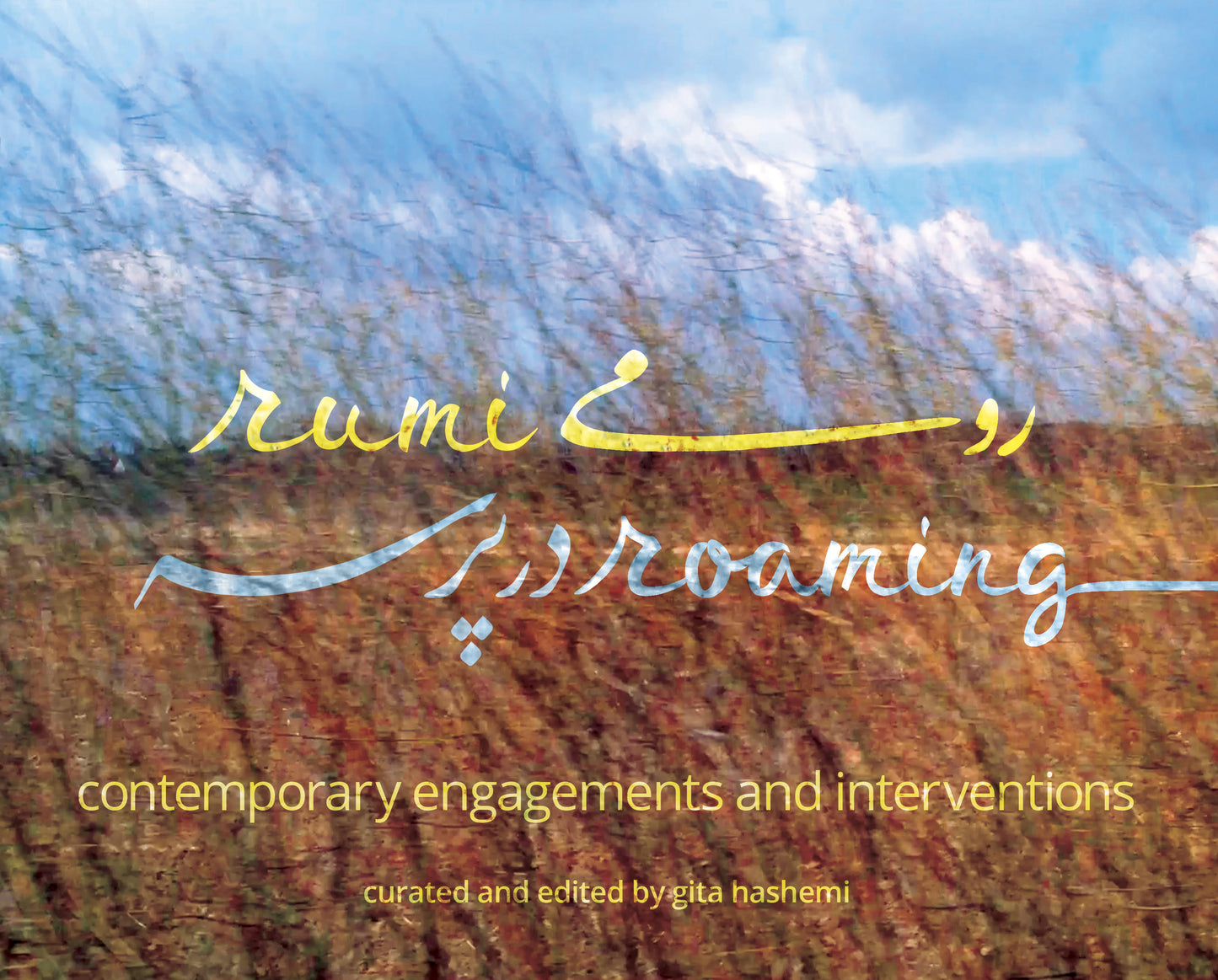rumi roaming
rumi roaming
contemporary engagements and interventions
By Gita Hashemi
rumi roaming: contemporary engagements and interventions originates in the desire to bring a decolonial Rumi-ness to our present contexts and communities. Living in pandemic isolation, many of us drew solace from Rumi, the 13th century Sufi poet-sage. While Rumi is a best-selling poet in North America, the boundary-breaking and situated nature of his work is often lost in colonial appropriations and (mis)translations. Rumi roaming juxtaposes new translations of some of Rumi’s ghazals with contemporary creative non-fiction, poetry, scholarly essays, photo essays, and videos that engage with his work through decolonial reflections on language, human connections, place, and spirituality.
Inspired by Rumi’s own early trajectory across Afghanistan, Iran and Turkey and the spiritual urgings of his ghazals, curator and editor Gita Hashemi draws attention to diverse geographies of Rumi’s circulation and brings together contributors from different cultural backgrounds and disciplines to intervene in the processes of cultural and spiritual appropriation and depoliticization of East-to-West translation. Rumi roaming invites us to think about Rumi in small caps and as a dynamic cross-cultural force within contemporary contexts of translingual poetics and translation politics, global displacement and relation to land and water, Indigenous language revitalization and diasporic language reclamation, and interrogations of spirituality, healing, and social justice.
Details
Details
Guernica World Editions (Guernica World Editions)
9781771839709
200 pages, 28 colour pages pages |
Couldn't load pickup availability
Reviews
Reviews
An encounter with Rumi is akin to chasing an elusive melody; one is perpetually left yearning for more. Yet, within the pages of rumi roaming, we are graced with a masterful intervention that confronts the crises of our modern age—a crisis rooted in language and its intricate dance of translation. Seamlessly weaving modern renditions of Rumi's ghazals with a tapestry of contemporary creative nonfiction, melodious poetry, scholarly musings, immersive photo essays, and haunting videos, this collection addresses a void I've perennially sensed in my engagements with Rumi's diverse oeuvre, from poetic verses to visual tapestries. The Algorithmic encounter that concludes this journey offers a wry nod, a poignant irony, underscoring the pressing relevance and urgency of such a groundbreaking endeavor.
Zainub Verjee, artist, critic and scholar, Governor General's Award recipient and Member of the Order of Canada
rumi roaming is the long-awaited work that finally addresses some of the most questionable aspects of the popular Rumi. That the popularity of Rumi’s bestselling translations in English remains unaffected by a rise in racism towards people who share his region and culture is a clear indication that the best-selling translations are failing profoundly, a failure felt most acutely by people of Persian and Central Asian origin. Sensitive to post-colonial problematics of translation and without avoiding the most challenging and potentially offensive aspects of Rumi’s oeuvre, in rumi roaming a diversity of creative thinkers bare their souls in the spirit of the poet himself to connect directly and transparently with their audience about how his poetry resonates with them in the present moment. This multi-media volume is far more sophisticated and nuanced in its vision of Rumi than criticisms that have focused simply on the stripping of Islamic references in popular translations. Rumi roaming provides a much richer and more creative re-reading of Rumi than has been previously available.
Jawid Mojaddedi, professor of religion at Rutgers University and translator of The Masnavi for Oxford World's Classics
rumi roaming masterfully shines a light on the complex and contradictory legacies of Rumi both past and present, and inevitably, the future. Artists, scholars, and activists bring themselves to the figure of Rumi and grapple with the various dimensions of Rumi's life, social context, and literary outputs, especially as it has interjected their lives, such as his poetry that evoked love and longing, sexist, and patriarchal stories, and calls for revolution. The essays, poems, and art in these pages are multi-dimensional, multi-linguistic, and global. They challenge easy ideas of translation and transmission. Though Rumi remains a popular spiritual icon today, this volume and its contributors showcase that this popularity should not be taken at face value but needs to be interrogated and disentangled. The contributors to the volume and Hashemi have done a great service in taking this important and difficult first step for us the readers, but as with any mystical path, including that of Rumi's, the rest depends on what we the readers do with this knowledge.
M. Shobhana Xavier, professor of religion and diaspora at Queen's University and author of The Dervishes of the North: Rumi, Whirling, and the Making of Sufism in Canada
Learn More
Learn More
Contents
oneness of being, 1: dawn of existence
gita hashemi
to begin
notes on translation, transliteration, and pronunciation
sounding guide
rumi
masnavi, book one, section
raúl moarquech ferrera-balanquet
sama’ zikr recuerdos remembrances (español)
raúl moarquech ferrera-balanquet
translated by ml papusa molina
sama’ zikr recuerdos remembrances (english)
rumi
ghazal 1759
masoud eskandari
the self
gita hashemi
being the astrolabe: with fatemeh keshavarz, part
rumi
ghazal 1393
charles c. smith, meryem alaoui
between shadow and light
oneness of being, 2: come come
elena basile
the afterlife of rumi: with fatemeh keshavarz, part 2
rumi
ghazal 37
trish salah
after 37
gita hashemi
angel meets rumi in bulgaria
rumi
ghazal 1855
öykü tekten
two poems and two pages with marginalia 94
hajar hussaini
look at the moon
mahdi tourage
rumi is irrelevant
jayce salloum
indefinite allusions in a limitless sky
gita hashemi
roaming with rumi
oneness of being, 3: dust in the sunlight
rumi
ghazal 2131
nika khanjani
broken hands and feet
elena basile
making room for rumi
rumi
ghazal 294
hjalmer wenstob, tim masso, annika benoit-jansson
hišukʔiš c̓ awaak: exploring rumi through nuučaan̓uł
carly butler
mamaałni
zainab amadahy
anti-oppression is not a healing modality
rumi
ghazal 1789
radha d’souza
what can activist scholars learn from rumi?
ehab lotayef
i created you
rumi
ghazal 648
oneness of being, 4: open fields
credits and acknowledgements
colophon
ONELINE MEDIA
oneness of being, 1 | video by gita hashemi
masnavi 1, 1 | read by hajar hussaini (Persian), zainab amadahy (English)
ghazal 1759 | read by gita hashemi (Persian)
ghazal 1393 | read by charles c. smith (english), gita hashemi (Persian)
between shadow and light | performance by charles c. smith, meryem alaoui
oneness of being, 2 | video by gita hashemi
ghazal 37 | read by trish salah (english), gita hashemi (Persian)
after 37 | read by trish salah (English)
translating ghazal 1855 | elena basile and gita hashemi at work
ghazal 1855 | read by hajar hussaini (Persian)
alan kurdî | read by öykü tekten (English)
the tale of mistress and her donkey | read by mahdi tourage (Persian)
oneness of being, 3 | video by gita hashemi
ghazal 2131 | read by elena basile (English)
broken hands and feet | video by nika khanjani
ghazal 294 | read by jayce salloum (English)
ghazal 1789 | read by radha d’souza (English)
i created you | read by ehab lotayef (Arabic)
ghazal 648 | read by charles c. smith (English)
oneness of being, 4 | video by gita hashemi
Awards
Awards

About the author
Iranian-born Gita Hashemi is an award-winning artist, curator and writer, a refugee, a displanted settler who works from T’karonto, the “Dish With One Spoon Territory,” the homelands of the Anishinaabeg, Haudenosaunee, and Huron-Wendat nations, most recently the territory of the Mississaugas of Credit. She lives near Wonscotonach (burning bright point) river, on unceded land that is subject to the 2015 Rouge River Tract Claim by the Mississauga First Nation. Her home in Shiraz was near Khoshk (dry) river.

